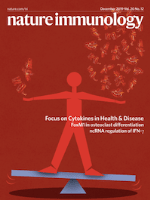
NATURE IMMUNOLOGY
Scope & Guideline
Advancing immunological frontiers with groundbreaking research.
Introduction
Aims and Scopes
- Cancer Immunology:
Research in this area explores how immune responses can be harnessed to combat cancer, including studies on tumor-infiltrating lymphocytes, immune checkpoint inhibitors, and the tumor microenvironment. - Innate Immunity:
This scope encompasses investigations into innate immune cells, such as macrophages, dendritic cells, and natural killer cells, highlighting their roles in pathogen recognition, inflammation, and the regulation of adaptive immunity. - Adaptive Immunity:
Focused on T and B cell responses, this area includes studies on immune memory, T cell differentiation, and antibody production, aiming to elucidate the mechanisms behind effective immune responses. - Autoimmunity and Inflammation:
Research addressing the mechanisms underlying autoimmune diseases and chronic inflammation, including the role of regulatory T cells and cytokine signaling. - Infectious Diseases and Vaccinology:
This core area examines immune responses to infectious agents, vaccine development, and the impact of host genetics on vaccine efficacy. - Metabolism and Immunity:
Investigations into how metabolic pathways influence immune cell function, differentiation, and responses to infection and cancer. - Neuroimmunology:
Research that bridges neurology and immunology, focusing on how the immune system interacts with the nervous system and its implications for diseases like multiple sclerosis and neurodegeneration.
Trending and Emerging
- Immunotherapy and Precision Medicine:
There is a growing emphasis on personalized immunotherapy approaches, particularly in cancer treatment, utilizing patient-specific immune profiles to guide therapeutic strategies. - Single-Cell Analysis Techniques:
The rise of high-dimensional single-cell technologies is transforming the understanding of immune responses, allowing for detailed characterization of immune cell populations and their functions. - Microbiome and Immunity:
Research exploring the complex interactions between the microbiome and the immune system is gaining traction, highlighting how gut health influences systemic immunity. - Long COVID and Post-Infection Immunity:
Emerging studies focus on the immunological implications of long COVID, investigating how SARS-CoV-2 infection alters immune responses and contributes to persistent symptoms. - Neuroimmunology:
An increasing number of studies are investigating the bidirectional interactions between the immune system and the nervous system, particularly in the context of neurodegenerative diseases. - Metabolic Reprogramming of Immune Cells:
Research is increasingly focusing on how metabolic pathways influence immune cell function, particularly in the context of cancer and chronic disease. - Use of CRISPR and Genetic Editing in Immunology:
The application of CRISPR technology is emerging as a significant trend, allowing for precise modifications in immune cells to enhance their functionality and efficacy in therapies.
Declining or Waning
- Traditional Vaccine Development:
Research specifically targeting older vaccine platforms has decreased as new mRNA and viral vector technologies have gained prominence, shifting the focus to more innovative approaches. - Basic Immunological Mechanisms:
There is a noticeable decline in publications focusing solely on basic immunological mechanisms without clinical or translational relevance, as the field moves towards more applied research. - Inflammation without clear clinical implications:
Studies that examine inflammation in isolation, without linking to disease outcomes or therapeutic interventions, are less frequently published, as there is a push towards clinically relevant research.
Similar Journals
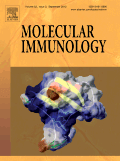
MOLECULAR IMMUNOLOGY
Advancing the Frontiers of Immune ResearchMOLECULAR IMMUNOLOGY, published by Pergamon-Elsevier Science Ltd in the United Kingdom, is a highly regarded journal in the fields of Immunology and Molecular Biology. With a focus on advancing the understanding of the immune system at the molecular level, the journal has been a critical resource since its inception in 1975. The journal is currently listed in the second quartile (Q2) of its category as per the 2023 rankings, indicating its substantial impact in both Immunology and Molecular Biology research. Researchers and professionals benefit from the journal's rigorous peer-review process and its commitment to publishing high-quality original research, reviews, and methodological studies that explore the intricate dynamics of immune responses. Although it does not currently offer an open access option, MOLECULAR IMMUNOLOGY remains an essential platform for scholars, emphasizing the significance of molecular interactions within the immune system and their implications in health and disease.
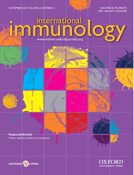
INTERNATIONAL IMMUNOLOGY
Exploring the Frontiers of Immune Science Since 1989.INTERNATIONAL IMMUNOLOGY, published by OXFORD UNIV PRESS, stands out as a premier journal in the field of immunology, providing a vital platform for disseminating groundbreaking research and innovative developments within the discipline. With an impressive Q1 ranking in Immunology and Allergy, as well as in Medicine (miscellaneous), it consistently showcases high-impact studies that contribute to the advancement of immunological knowledge. The journal spans over three decades, from its inception in 1989 to its ongoing contributions as of 2024, thus solidifying its reputation in the scientific community. Researchers, professionals, and students will find valuable articles that delve into the complexities of immune responses, therapeutic interventions, and emerging immunological paradigms, ensuring INTERNATIONAL IMMUNOLOGY remains at the forefront of knowledge in the life sciences.

HUMAN IMMUNOLOGY
Pioneering Insights into Immune ResponsesHUMAN IMMUNOLOGY, published by Elsevier Science Inc, serves as a critical platform for disseminating research in the fields of immunology and allergy, as well as various aspects of miscellaneous medicine since its inception in 1980. With an ISSN of 0198-8859 and E-ISSN 1879-1166, this journal is pivotal for researchers and practitioners looking to advance their understanding of human immune responses and related conditions. The journal currently holds a respectable position within its field, as highlighted by its 2023 Scopus ranks—#114/233 in Immunology and Allergy and #132/236 in Immunology and Microbiology. Moreover, it maintains a Q2 quartile ranking in both Immunology and Allergy and miscellaneous Medicine, underscoring its influence and reach within the scientific community. Although it does not currently offer Open Access options, HUMAN IMMUNOLOGY remains dedicated to providing valuable insights and fostering academic discourse within its discipline, characterized by a rigorous peer-review process and a focus on innovative research trajectories.

Immunotherapy Advances
Exploring novel strategies for a healthier tomorrow in immunotherapy.Immunotherapy Advances, published by Oxford University Press, stands at the forefront of the rapidly evolving field of immunology and microbe interactions, focusing specifically on novel immunotherapeutic strategies and their clinical applications. Established in 2021, this peer-reviewed journal aims to disseminate high-quality research that contributes to the understanding and advancement of immunotherapeutic techniques, potentially transforming patient care in immunology. With a current Scopus rank of #140 out of 236 in the realm of Immunology, placing it in the 40th percentile, Immunotherapy Advances is positioned to be an integral resource for researchers, healthcare professionals, and students eager to stay updated with groundbreaking findings and methodologies. The journal is dedicated to fostering innovative discussions and collaborations, ensuring open access to vital research that influences treatment paradigms globally.

Annual Review of Immunology
Pioneering Insights into Immune Responses and DisordersThe Annual Review of Immunology, published by Annual Reviews, is a premier journal that has been contributing to the field of immunology since its establishment in 1983. With a strong reputation highlighted by its impressive impact factor and top-tier rankings—holding the Q1 category in both Immunology and Immunology and Allergy, alongside significant Scopus Rankings—this journal serves as an essential resource for researchers, professionals, and students alike. The Annual Review of Immunology covers the latest advancements and critical developments in the domain, fostering a better understanding of immune responses and disorders. Although it is not an open-access journal, it provides comprehensive reviews that synthesize emerging data and trends, making it indispensable for those at the forefront of immunological research. With volumes anticipated through 2024, it continues to set the standard for high-quality scholarly publications in the field.
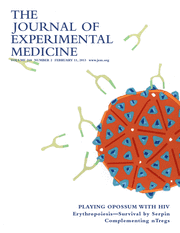
JOURNAL OF EXPERIMENTAL MEDICINE
Advancing the Frontiers of Medical ResearchJOURNAL OF EXPERIMENTAL MEDICINE, published by Rockefeller University Press, is a renowned peer-reviewed journal dedicated to advancing the field of experimental medicine since its inception in 1896. With an impressive impact factor and categorized in the Q1 quartile for Immunology, Immunology and Allergy, and Miscellaneous Medicine, this journal stands at the forefront of medical research and innovation. It provides a prestigious platform for scholars and practitioners to disseminate groundbreaking findings that drive the understanding of disease mechanisms and therapeutic strategies. While the journal is not open access, it maintains high visibility and engagement within the scientific community, fostering collaboration among researchers, professionals, and students alike. The journal's consistent ranking in the top percentiles of Scopus illustrates its significant impact and commitment to excellence in medical research.
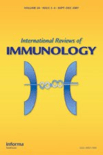
INTERNATIONAL REVIEWS OF IMMUNOLOGY
Elevating Immunology: Where Science Meets PracticeINTERNATIONAL REVIEWS OF IMMUNOLOGY, published by Taylor & Francis Inc, is a leading academic journal that has been a cornerstone of immunological research since its inception in 1986. With an impressive impact factor and ranked in the top quartiles of its field (Q2 in both Immunology and Allergy), this journal offers a critical platform for the dissemination of influential findings and advancements within immunology. Spanning a diverse array of topics, from basic immune mechanisms to clinical applications, it aims to support the global scientific community in enhancing immunological understanding and therapeutic interventions. Researchers and professionals alike benefit from insights provided by renowned contributors, ensuring that the journal remains relevant in a rapidly evolving field. Directly accessible through subscription or institutional access, INTERNATIONAL REVIEWS OF IMMUNOLOGY is committed to fostering collaboration and innovation, making it an essential resource for anyone involved in immunological research and practice.
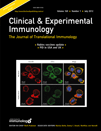
CLINICAL AND EXPERIMENTAL IMMUNOLOGY
Catalyzing Knowledge in Clinical and Experimental ImmunologyClinical and Experimental Immunology, published by Oxford University Press, is a premier journal that has been a cornerstone in the field of immunology since its inception in 1966. With an ISSN of 0009-9104 and an E-ISSN of 1365-2249, this journal holds a significant position in academic research, currently ranking in the Q2 category for both Immunology and Allergy (2023). Its impactful contributions are reflected in its Scopus rankings, where it stands at Rank #63 out of 233 in Immunology and Allergy, placing it in the 73rd percentile, and Rank #73 out of 236 in Immunology and Microbiology. Researchers, healthcare professionals, and students will find this journal an invaluable resource for cutting-edge studies, reviews, and clinical advancements in the ever-evolving domain of immunology. While the publication does not offer open-access options, it remains a pivotal platform for disseminating knowledge that impacts both clinical practice and experimental research.
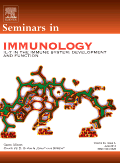
SEMINARS IN IMMUNOLOGY
Elevating Discourse in Allergy and ImmunologySEMINARS IN IMMUNOLOGY, published by Academic Press Ltd - Elsevier Science Ltd, stands as a leading journal in the field of immunology and allergy, with an impressive impact factor that reflects its significant contribution to advancing research and discourse within these vital areas of medical science. Established in 1989, this esteemed journal has garnered a reputation for disseminating high-quality, peer-reviewed articles that span a broad spectrum of immunological topics, making it an essential resource for researchers, healthcare professionals, and students alike. Currently ranked Q1 in both Immunology and Allergy categories, SEMINARS IN IMMUNOLOGY ranks 39th among 233 journals in Immunology and Allergy and 43rd among 236 in Immunology and Microbiology according to Scopus, placing it in the 83rd and 81st percentiles respectively. This underscores its pivotal role in shaping the future of immunological research and clinical practices. While the journal operates under a subscription model with no open access option, it remains committed to providing comprehensive insights and fostering scholarly collaboration within the global immunology community.
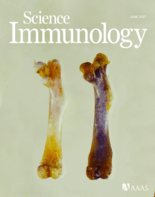
Science Immunology
Connecting Science and Solutions in ImmunologyScience Immunology, published by the American Association for the Advancement of Science, is a leading journal in the field of immunology, recognized for its significant impact and rigor in advancing our understanding of immune responses and complex diseases. With an impressive impact factor that places it in the Q1 category of both immunology and allergy, as well as miscellaneous medicine, this journal is ranked #7 and #8 in their respective Scopus categories, reflecting its high-quality research output. Since its inception in 2016, Science Immunology has been at the forefront of interdisciplinary immunological research, fostering crucial insights that link immunology with pressing health challenges. The journal is committed to providing open access to its content, ensuring that groundbreaking findings are accessible to a global audience of researchers, professionals, and students. Its anthology not only addresses fundamental immunological mechanisms but also enhances the dialogue on translational applications and therapeutic interventions, solidifying its position as an essential resource within the scientific community.